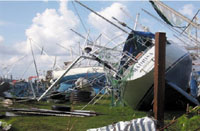
Island after the hurricane: Grenada struggles to recover from devastation [Archives:2005/856/Last Page]
July 4 2005
 |
In 2004, the United Nations Department of Public Information (DPI) launched an initiative called “Ten Stories the World Should Hear More About” to draw attention to important international developments and issues that fall outside the media spotlight. The list includes stories on an array of issues and from several geographical regions. Some of the stories on the list focus on troubling humanitarian emergencies and conflict situations, but they also highlight such vital areas as human rights, health and development. Every issue, we will bring a new story to you, hoping that our little effort to advocate for human rights all over the world would make a difference, some how, some way The editor
Its not just the money! Three months before the tsunami grabbed world headlines, the island paradise of Grenada was ripped by Hurricane Ivan. The world responded generously at the time, but seven months later most of the country's housing remains in ruins; an example of how disaster recovery needs the sustained support of the international community.
The Story
Oceans away from last December's tsunami, the tiny Caribbean island of Grenada is living proof of how difficult it can be to translate outpourings of international assistance into recovery and reconstruction. In September of 2004, Hurricane Ivan swept the Caribbean taking 80 per cent of Grenada's infrastructure with it and devastating the spice and tourist industries. The world responded generously to the calamity, which killed 39 of the tiny nation's 103,000 people and left 90 per cent of the nation's 28,000 houses in shambles. But seven months later, the 'Spice Island' – famed for its nutmeg, mace, cinnamon, ginger and cloves – is still struggling to pull itself back together.
Most of the nutmeg trees which made Grenada the world's second-largest producer, were uprooted by Ivan and although the cruise ships are returning with tourists, most of those who serve them have yet to rebuild their homes. “It's been slow, slow going,” reports Michelle Gyles-McDonnough, Liaison Office Coordinator for the United Nations Development Programme (UNDP) in Barbados. “Technical capacity even before the hurricane was modest in most sectors, but now progress has been severely impacted. We have yet to rebuild certain basic systems to a degree that will allow us to move forward.”
Grenada's experience is mirrored in the city of Bam, Iran, as it struggles to recover from the 2003 earthquake. Both make clear that disaster recovery is a long term affair that needs sustained support from the international community.
The Context
– Grenada's housing target is the reconstruction of 1,000 homes in 2005. As of March, only 23 homes had been rebuilt with government assistance, with another 50 under construction. It is estimated that some 10,000 homes will need to be constructed with public aid.
– With thousands of people traumatized by the disaster, the need to deal with the psychosocial dimension of this crisis has become an important element of the recovery process, which the government is trying to address by formulating a national wellness programme.
– Among positive developments, having received relatively high funding and attention from the international community, the education sector is on the road to recovery. All schools have reopened, although some are operating in shifts. Most buildings have made at least temporary repairs.
For further information
UN Office for the Coordination of Humanitarian Affairs (OCHA):
Gerard Gomez, Regional Disaster Response Advisor (Panama), Tel. +507 317 1748, E-mail: [email protected];
United Nations Development Programme(UNDP):
Theo Gittens, Communications Officer (New York), Tel. + 1 212 906 5013, E-mail: [email protected];
Michelle Gyles-McDonnough, Coordinator, UNDP Liaison Office, St. George's, Grenada, Tel: +473 439 5599, E-mail: [email protected].
——
[archive-e:856-v:13-y:2005-d:2005-07-04-p:lastpage]


